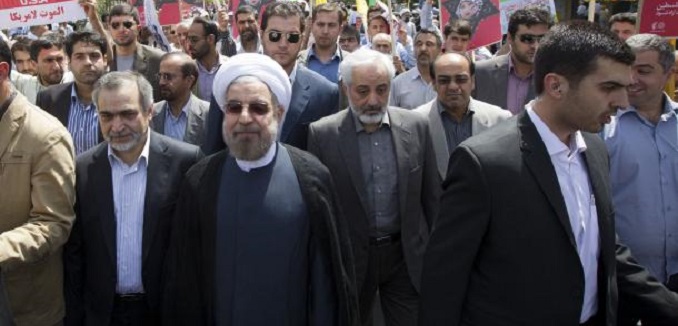Agence France-Presse (AFP) on Friday described the fallout from what it described as the “first major political defeat” for Iranian President Hassan Rouhani, a failed campaign by the Rouhani government to convince Iranians to put aside and forgo government assistance programs that had been developed under previous administrations. The campaign had urged some Iranians to waive the cash handouts, and had mobilized Iranian celebrities, politicians, and religious figures to convey the message.
Figures released on Wednesday indicated that 95 percent of the country, at a minimum, had declined to respond to the Rouhani government’s call and had instead requested the money. AFP bluntly noted that “the low rate of dropouts was mocked in conservative circles, and even moderates and reformists expressed criticism”:
A pro-Rouhani activist, who asked for anonymity, told AFP: “Instead of concentrating where he could persuade supporters—on social media—the government reached out to the wrong audience, on state television.”
“What they effectively managed to do was alienate Rouhani’s staunchest supporters,” the activist said, recalling a session of parliament on April 15 when Economy Minister Ali Tayyebnia told lawmakers that “10 million wealthy Iranians have been identified.”
This latest incident comes amid renewed attention – by U.S. diplomats, top global diplomatic officials, and media outlets – to a surge in Iranian executions and human rights violations under the government of the revolutionary-era cleric.
Analysts have been concerned since Rouhani’s election that the self-described moderate had been favored by the Islamic republic’s unelected leaders as a public face for immoderate policies, and that he would lack either the political capital or the public popularity to implement genuine reforms. The regime seems to have engineered the election in his favor by clearing the field to Rouhani’s left while leaving half a dozen candidates competing for the remaining votes to his right.
Last week’s developments come alongside deepening concerns that an upsurge in executions may indicate that Rouhani has either been unable or unwilling to moderate Iran’s human rights policies. United Nations Secretary General Ban Ki-moon recently stated that the current government “had not made any significant improvement” in ending abuses, echoing the assessment of a February State Department report. Rouhani’s domestic policies are being read as having international implications.
The Wall Street Journal last week cataloged recent beatings that have left dozens of imprisoned political opponents in the hospital:
Western governments have treated President Rouhani as the great moderate hope—an Iranian version of China’s Deng Xiaoping. They forget that Mr. Rouhani has been a lifelong security apparatchik, having helped engineer the regime’s bloody 1999 crackdown on Iran’s student movement. His government also bans Twitter TWTR +0.43% (except for public officials) and is setting modern records for the number of public executions. And unlike Deng, whom Mao purged, Mr. Rouhani has always been part of the regime’s inner circle.
Perhaps a regime, and a president, that can brutalize political dissidents as a matter of routine can prove reasonable at the nuclear negotiating table. We wouldn’t count on it, and neither should the West.
[Photo: Abayomi Azikiwe / Flickr]




